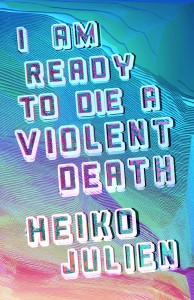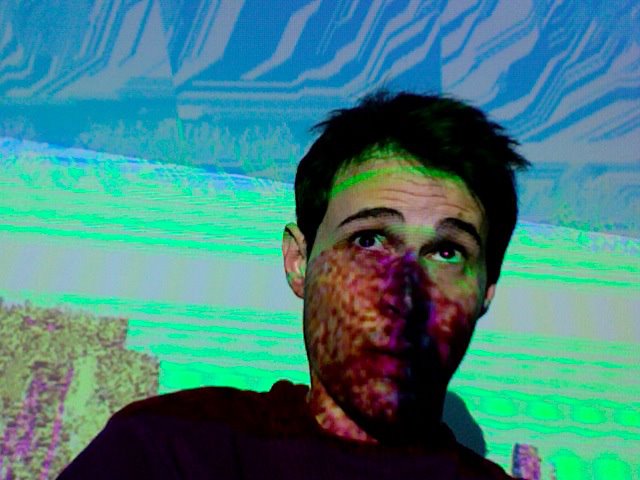I Am Ready To Die A Violent Death by Heiko Julien
 I Am Ready To Die A Violent Death
I Am Ready To Die A Violent Death
by Heiko Julien
Civil Coping Mechanisms, Nov 2013
Book Page at CCM
In I Am Ready To Die A Violent Death, Heiko Julien presents to us a kaleidoscope of images, ranging from the suburban, to pop culture references, memes, and the internet, presented through a meditative narrator questioning everything they see, while at the same time doubting what they are saying. Ironically the writing is both positive and self-deprecating at the same time, mirroring the multi-faceted life we inhabit online through different personas; we are both the nice, tolerant and compassionate person, and we also want to die a violent death, alone, so we can feel something that is real in a physical sense, not just through social networking.
What strikes me first of is that these pieces began as either self-published e-books, Tweets, or Facebook posts. This way of sharing ‘content’ online seems to be central to ‘Alt lit.’ Heiko has already begun a dialogue with his audience before the book has been published; I had read most of these pieces online before coming to read this book. This is quite a unique trend that is happening in the publishing world; there isn’t one way of ‘being a writer.’ And the idea of publishing itself has become quite flexible. I feel that Heiko is aware of this, and the writing in this collection reflects the continued dialogue he has with the Alt Lit community, which he seems to be a major part of.
“Facebook is the void that talks back.” (facebook post)
Heiko is well aware of the power of memes, in a similar way Steve Roggenbuck talks about the memeplex, which he defines as “a grouping of associated memes that are consistent and which support each other.” And that a “meme” is a unit of culture and/or anything that is spread by imitation (stylistic moves included). Heiko also uses the language of memes to project this view; via different forms of online language, be it advertising, tweets, Facebook, or blog posts.
I am afraid of men but I am a smart boy so i intellectualize my fear in the form of Cool Shaming and Tight Blaming. If I’m being honest, I would like to be the Number One Dude. I admire strong guys. I like to watch them play sports. I relate to the idea of a Buff Bro. I like a dude so top heavy I can topple him with a good push. I like to push dudes into pools in the summertime.
For Heiko, as well as others in the online community, memes also constructed through online ‘brands’ or ‘personas’, where ones identity becomes a meme. This feels like one of the central themes to not just Heiko’s writing, but to the ‘genre’ of Alt Lit. What makes Alt Lit a unique genre, however, is that it feeds into the aspects of an online community members and environment which Heiko references a lot in his writing, and the online community all construct different personas, or identities, through different social media outlets. In this way, Heikos writing puts a mirror up not just to himself, but the community he responds to. The writing does not just reflect the community that is Alt Lit, however, it also stems from something else, something more ‘human,’ or ‘natural‘, whatever that may mean in the ‘internet age‘ that we all live in. Social stereotypes become crystalized through online media, which in turn become memes, and a part of the online language that Heiko channels in his pieces.
But I guess what I most want is to be in actual love with a woman who actually loves me back until we die painless, unexpected deaths simultaneously, but someone told me this was already done in a Bad Movie.
There is a strong sense of irony in these pieces, that the only meaningful things that can be said have already been said through media, and that is all the narrator knows. Memes have become our ‘language,’ our way of communicating in our ‘environment,’ and these pieces show the point of where a meme stops and the human being typing them begins. The writing is a projection of the narrator’s own inner dialogue, while at the same time being mixed in with memes and other online jokes. In this way, we are constantly reminded that there is a person behind the writing, a person who has their own desires, goals, and emotions.
and we are dancing
like we know people
Out There
want to take our money
and kill us
and we still think they are beautiful
Notice how “Out There” has been capitalized, this “other” could possibly mean something like a world free from online content, something more ’real’, but the narrator, by calling it the other, has no idea what this could be. In doing so, we are shown a crisis the narrator is having, and one that we are all aware of; all we are becoming aware of is our online presence, then what is our ‘real’ identity?
You can see a lot of Rare Vids of Young Dudes hanging out at home and doing funny voices if you search Just Chillin on YouTube. Go ahead and try this and maybe then you will learn how to love without needing to receive anything in return.
November 8th, 2013 / 11:00 am
Leaving Hawaii: An Interview with Heiko Julién

OK, interview. (interview is beginning)
(swallows gum)
I am listening to Riff Raff “Rice Out” on repeat, for context.
I am currently broke.
(Irony)
Cool. I am wearing my brothers t-shirt and shorts and am on his computer at my parents’ house.
Nice.
He has soccer shorts but he doesn’t play soccer. He just likes to watch the players I guess.
What topics are on the table. Your ebook. Can we talk about Hawaii?
Wonder if he calls it Football. Not sure how authentic he is… Yes indeed we can [talk about Hawaii].
Sweet.
I have a lot to say about Hawaii.
Please talk about, Hawaii… READ MORE >
